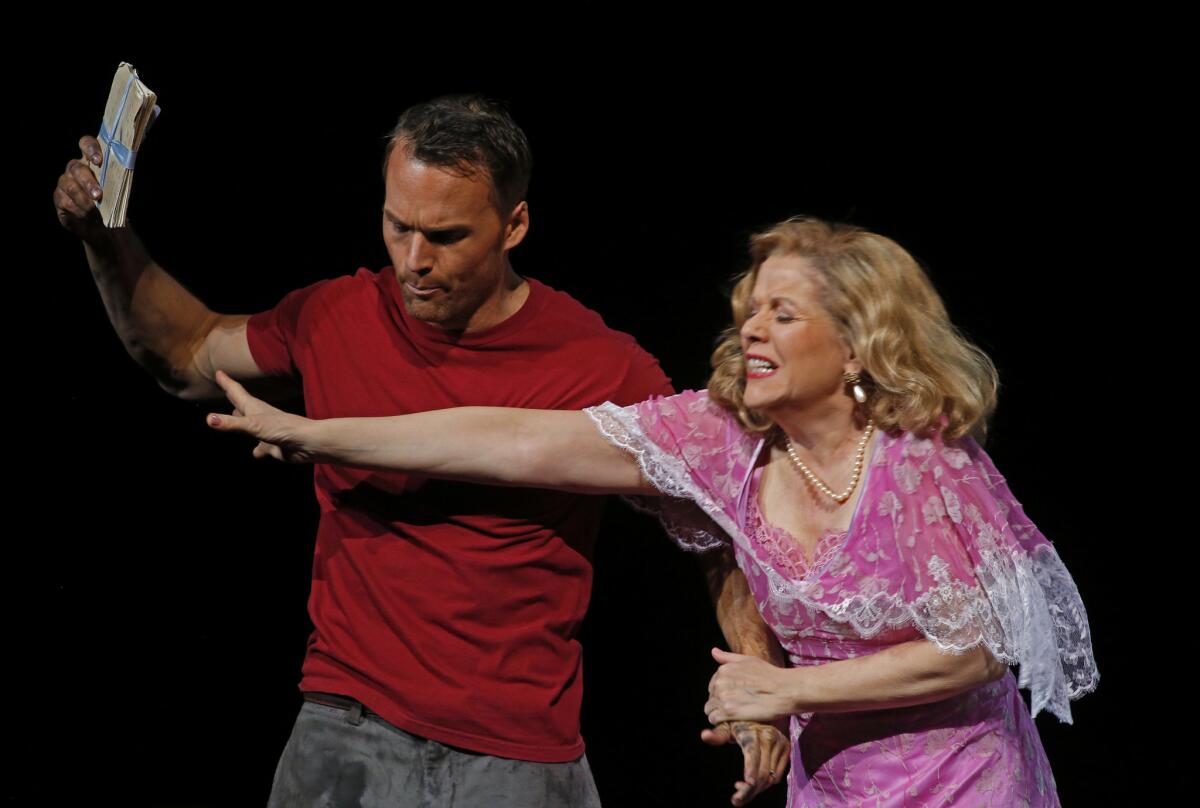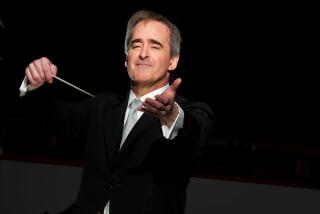Review: Rapturous response to André Previn’s ‘Streetcar Named Desire’

It was 25 years ago last month that André Previn angrily resigned as music director of the Los Angeles Philharmonic over artistic control. Long before that, though, Previn had begun burning bridges with Los Angeles, where he grew up and became a prominent film composer, jazz pianist and chamber musician.
But there could be little doubt Sunday, when the Los Angeles Opera gave the local premiere of Previn’s “A Streetcar Named Desire,” that he is considerably more successful a musician than an arsonist. The bridges still stand.
A few minutes before the late afternoon performance was to begin, there was a long line at the Dorothy Chandler box office. The crowd seemed to include people from all walks of musical life, including and especially the jazz and film worlds.
As far as I could tell, this opera was the first note of Previn’s music to be heard in the last quarter century in the Chandler, where Previn held sway with the L.A. Phil in its former home from 1985 to 1989. Despite an imperfect production, the response to “Streetcar” on Sunday was rapturous.
Audiences here are not just curious about Previn’s music but also seemingly hungry for it. I wish the conductor, Evan Rogister, had acknowledged the cheers by holding the score over his head as is sometimes done with contemporary works. Without Previn’s Hollywood studio experience, this opera wouldn’t be a quarter as good as it is.
The first of Previn’s two operas, “Streetcar” had its premiere by San Francisco Opera in 1998 (his second opera, “Brief Encounter,” was given in Houston in 2009). The reaction in the Bay Area was mixed. Stymied by Tennessee Williams’ estate, librettist Phillip Littell was required to stick too closely to the original play, essentially paring down Williams’ words, with a handful of arias being all that was newly operatic.
Previn’s score seemed on first impression undernourished, an often genial, slightly jazzy underscoring of Williams’ play. Written for Renée Fleming, the soprano’s Blanche DuBois, a role she is now repeating at the Chandler, was the one fully realized character. But back then, Fleming, ever ravishing, appeared unwilling, at least vocally, to reveal Blanche’s blemishes.
The San Francisco production looked too much like Elia Kazan’s famous movie of “Streetcar.” Previn conducted in a laid-back manner. And so on.
First impressions in opera are just that. “Streetcar” may have been slow to catch on, but that is now happening. A live recording from San Francisco revealed a rich and remarkable subtlety of atmosphere and expression that quietly lurked beneath the surface.
Brad Dalton’s production, which comes to L.A. Opera from Lyric Opera of Chicago, is intended to give the music more primacy. The sets are bare bones — chairs, a table, a bed and a few props.
At the Chandler, the orchestra was placed on a racked stage, slightly sunken and behind the singers. The orchestra pit remained empty except for a lonely prompter.
The characters, however, wore period dress, or in the case of Ryan McKinny’s often shirtless Stanley Kowalski, Marlon Brando-esque undress. A handful of well-buffed Stanley look-a-likes served as extras and stagehands, looking like they might have had an off night as members of the Jets in “West Side Story.” Gratuitous ghosts appear from Blanche’s past.
An attempt at naturalistic acting was moderately successful. But instead of bringing out something elemental in the work, this seemed simply as though it were opera on the cheap. The cast was excellent, but in a hall the size of the Chandler, they weren’t about to dare intimacy.
Fleming remains a radiant presence. Her Southern drawl is beguiling. So are her high notes, as full and brilliant as ever. Her voice has thickened in the 16 years since she premiered “Streetcar,” but it has lost barely a hint of its luster.
What has changed is that you sense the effort. Smoothing rough vocal edges makes Fleming sound like she’s hiding something, which Blanche, who is escaping her past, is. Meanwhile, Fleming’s lower register has become darker and more expressive, and that is now where you sense the real Renée, and maybe Blanche, is hiding.
L.A. Opera has found a believable cast with McKinny’s unquestionably virile Stanley, Stacey Tappan’s earthy Stella, Anthony Dean Griffey’s affectingly vulnerable Mitch and Victoria Livengood’s booming Eunice.
Even so, the essence of “Streetcar” is found in the orchestra. Previn’s instrumental writing is lean. He sets up atmosphere and moods with slinking trombone glissando, a couple of chords in the strings, a jazzy saxophone riff, a little one-bar duet for clarinets. Much of this is a remarkable refinement of the way Previn worked in the movies.
There are a few big moments. The rape scene is Shostakovichian, although Rogister, whose conducting was incisive but not fleshy — barreled through. And there are arias that too obviously explain motivation, such as Blanche’s “I Believe in Magic.”
But most of the opera simply flows naturally, thanks in great part to Previn’s perfectly inflected yet unaffected vocal lines that are exquisitely integrated into the orchestral mood making.
Or least that is what should happen. Placing the orchestra at the back of the Chandler stage created the sense that musicians and singers were in separate rooms. From where I was sitting downstairs, the voices were so prominent that this might have been “Streetcar” as a play with background music. I’m told that in the balconies, the effect was exactly the opposite, with the instruments drowning out the singers.
In Previn’s “Streetcar,” it is the fragility of grace between voice and instrument from which the story’s inner violence can be uniquely understood. Some of that is inevitably missed in the Chandler. But so is Previn. And it is good to have him back in any guise.
---------------
‘A Streetcar Named Desire’
When: 7:30 p.m. Wed. and Sat.
Tickets: $17-$311
Contact: (213) 972-8001 or https://www.laopera.com
Running time: 3 hours, 15 minutes
More to Read
The biggest entertainment stories
Get our big stories about Hollywood, film, television, music, arts, culture and more right in your inbox as soon as they publish.
You may occasionally receive promotional content from the Los Angeles Times.







